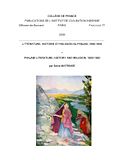Littérature, histoire et religion au Panjab
Matringe, Denis:
Littérature, histoire et religion au Panjab, 1890-1950 = Panjabi literature, history and religion, 1890-1950 / par Denis Matringe. - Paris : Collège de France ; diff. de Boccard, 2009. - 221 S. : Ill. - (Publications de l'Institut de civilisation indienne. Série in-8° ; fasc. 77)
ISBN 978-2-86803-077-1
EUR 30,00
DDC: 891.4209
Beschreibung
Entre les premiers écrits de Bhāī Vīr Siṅgh (1872-1957) et ceux d'écrivains comme Amritā Prītam (1919-2005) et Jasvant Siṅgh Kamval (né en 1923), la littérature panjabie écrite par des auteurs sikhs ayant choisi de s'exprimer dans leur langue maternelle connaît une évolution analogue à celle qui caractérise d'autres littératures indiennes dans le siècle qui va de la révolte des cipayes en 1857 à l'indépendance de l'Inde et à sa partition en 1947. Dans le contexte colonial, elle s'affranchit graduellement de l'apologétique et du réformisme religieux dont elle était nourrie, invente au contact des modèles européens de nouvelles formes et se fait souvent contestatrice de l'ordre établi. Aux œuvres hybrides du tournant du XXe siècle, encore traditionnelles à bien des égards, mais déjà affectées par la modernité, succèdent des créations poétiques libérées ainsi que des nouvelles et des romans bientôt analogues aux œuvres européennes du même type. Ces textes offrent un accès immédiat au vécu et au ressenti de ce qui se jouait alors dans l'histoire du Panjab, en même temps qu'ils montrent à l'œuvre l'interculturalité caractéristique d'une région où les écrivains sikhs étaient nourris de leur propre tradition scripturaire, des grands classiques persans, de ceux de la littérature musulmane en panjabi et des chefs-d'œuvre occidentaux.
From Bhāī Vīr Siṅgh's (1872-1957) first published works to those of Amritā Prītam (1919-2005) and Jasvant Siṅgh Kamval (born in 1923), one can perceive a similar evolution between the Panjabi literature whose Sikh authors choose to write in their mother tongue and other Indian works published during the century that goes from the Great Rebellion of 1857 to the independence and partition of India in 1947. In the colonial context, unburdened from apologetics and religious reformism, influenced by European models, these authors were able to invent new forms and to contest the established order. Following the hybrid works of the turn of the 20th century, still traditional in many ways, but already affected by modernity, non constrained poetical creations as well as short stories and novels were published, soon analogous to the European writings of the same type. These texts offer an immediate access to personal experiences of what was then at stake in the history of the Panjab, while they show at work the characteristic cross-culture of a region where Sikh writers were soaked with their own scriptural tradition, the great Persian classics, the Panjabi Muslim literature and Western masterpieces. [Verlagsinformation]
Inhalt
Transcription et translittération / Transcription and transliteration
Introduction / Foreword
I. Une épopée spirituelle apologétique : Rāṇā Sūrat Siṅgh de Bhāī Vīr Siṅgh / An apologetical spiritual epic : Rāṇā Sūrat Siṅgh by Bhāī Vīr Siṅgh
II. Réformisme sikh, retour aux sources et identité exemplaire : Bābā Naudh Siṅgh de Bhāī Vīr Siṅgh / Sikh reformism, return to basics and exemplary identity : Bābā Naudh Siṅgh by Bhāī Vīr Siṅgh
III. Lyrisme et réformisme dans la poésie de Bhāī Vīr Siṅgh jusqu’au début des années 1930 / Lyricism and reformism in Bhāī Vīr Siṅgh’s poetry until the early 1930s
IV. Le Panjab et sa culture populaire dans la poésie panjabie des années 1920 et du début des années 1930 / The Panjab and its popular culture in the panjabi poetry of the 1920s and early 1930s
V. Les débuts de la nouvelle et du roman en panjabi / The beginning of the short story and the novel in Panjabi
VI . Critique sociale dans la nouvelle panjabie des années 1930 : le cas de Ṭhāṇedārī / Social criticism in the Panjabi short story of the 1930s : the case of Ṭhāṇedārī
VII. Mohan Siṅgh : une poétique de l’ambivalence / Mohan Siṅgh : poetics of ambivalence
VIII. Une voix de la partition : un poème et un roman d’Amritā Prītam / A Partition voice : a poem and a novel by Amritā Prītam
IX. Hīr Vāriṡ Šāh revisitée / Hīr Vāriṡ Šāh revisited
Annexe : légendes panjabies / Appendix : Panjabi legends
English summary
Panjabi summary
Index
Bibliographie
Autor
DENIS MATRINGE, Directeur de recherche au CNRS, Directeur du CEIAS. Présentation.
Quellen: De Boccard; WorldCat.

